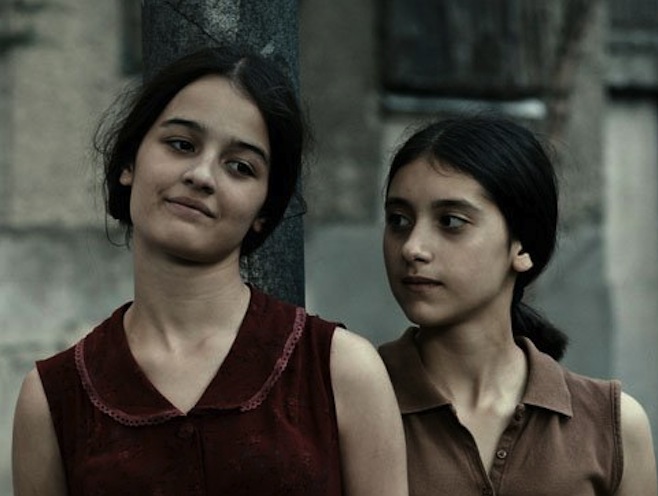Film Review: “In Bloom” — Girls, Guys, and a Gun
“In Bloom” is one of the best features to come out of Eastern Europe in recent times.
By Gerald Peary
It’s a long hard road to the final five, those pictures nominated each year for Best Foreign Film. In Bloom (at the Museum of Fine Arts Boston, April 16 through 30), Georgia’s official nomination for 2013, didn’t make the cut. That’s unfortunate, as it’s one of the best features to come out of Eastern Europe in recent times, skillfully directed by the wife and husband team of Nana Ekvtimishvili and Simon Gross (he hails from Germany), and featuring the fluid, tough-minded cinematography of Romania’s Oleg Mutu, who shot the Romanian modern classics The Death of Mr. Lazarescu and 4 Months, 3 Weeks, and 2 Days.
In Bloom, set in post-Soviet Union 1992, is said to evoke the childhood of Ekvtimishvili, also the screenwriter, who grew up then in the capital of Tbilisi. It’s a rough time in a newly independent country. There’s fighting in the north, and excruciating bread lines, and everyone we see is stressed, combative, unhappy. And crunched into tiny apartments with various and sundry in-laws.
The title refers, I guess, to two budding teenage friends, Eka (Lika Babluani) and Natia (Mariam Bokeria). 14-year-old schoolmates. Eka, pale and short, is the studious one, the stone-faced serious one, and not quite ready for boys. Natia, tall and glamorous and with shimmering curly hair, is a flirt with a very cute guy courting her.
Neither has a pleasant home life.
Eka lives with her distant, self-absorbed mother and also an unsympathetic older sister, who smokes incessantly and giggles on the phone. Eka’s dad is somewhere away. She fetishizes him in absentia, often going through his bureau drawer of possessions. Natia has things far worse: the archetypal Eastern European drunken father, thus parents who are always brutally feuding, a depressed younger brother, a screeching grandmother who yells at her daughter and son-in-law: “It’s impossible to live with you people. You are all crazy!”
Jean-Luc Godard famously said something like, “All you need for a movie is a girl and a gun.” In Bloom has its two girls and, after a while, the final necessary component. Natia’s boyfriend, leaving town, gives her a weapon as a present. As protection. And for the final hour of the film, that gun gets passed between Elka and Natia and back, and we wait for someone to shoot it. There are lots of potential targets, starting with two stunted boys who keep stopping the girls in the streets and bullying them. Perhaps Natia’s vodka-soaked dad? More likely, Kote, Natia’s monkey-faced thug of a husband.
Yes, a husband. Modern Georgia is still in the middle ages, when Kote and a truck full of cretinous men kidnap Natia in broad daylight, and before an intimidated crowd. They drive her into the countryside, where Kote presumably rapes her. She’s now his, and a marriage is on the way. It’s In Bloom’s virtuoso scene, a raucus, crowded wedding, for which the groom’s indigent family spent all their money, where soused men act like beastly fools, and where Natia struggles to smile, convincing herself she’s actually in love with the goon who forcibly deflowered her.
Is it time for the gun?
Gerald Peary is a professor at Suffolk University, Boston, curator of the Boston University Cinematheque, and the general editor of the “Conversations with Filmmakers” series from the University Press of Mississippi. A critic for the late Boston Phoenix, he is the author of 9 books on cinema, writer-director of the documentary For the Love of Movies: the Story of American Film Criticism, and a featured actor in the 2013 independent narrative Computer Chess.

